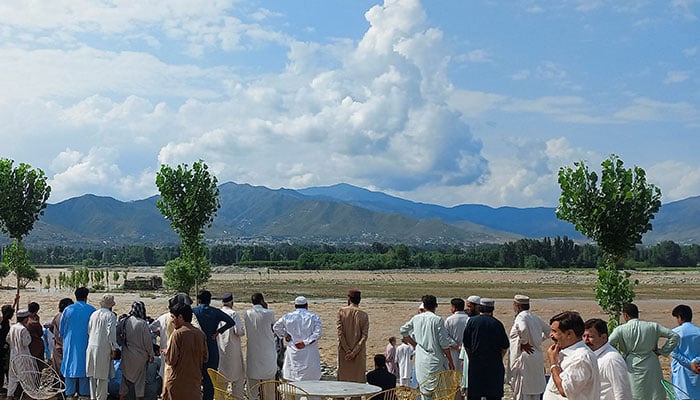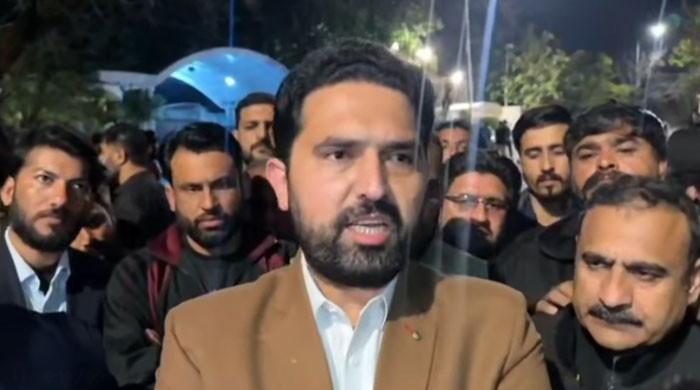Encroachments, absent officials: Probe report reveals glaring govt lapses behind Swat River tragedy
Culture Department recommends introducing licensing regime for hotels, deployment of Tourism Police
July 19, 2025

- Tourism department entirely absent from tragedy site: report.
- Probe highlights CTA's failure to licence hotels in tourist hotspots.
- Holds hotel management responsible for incident, negligence.
PESHAWAR: A fact-finding report of the Khyber Pakhtunkhwa government into the Swat River tragedy has disclosed glaring lapses on the provincial administration's part, which resulted in the deaths of a dozen tourists last month.
The Culture and Tourism Department's inquiry report points out that not only was the Tourism Department "entirely absent from the scene of the tragedy" and there was no proactive engagement in regulating or managing the safety, the official tourist helpline (1422) remained unused, reflecting the lack of public awareness and outreach.
The Swat River incident, which occurred on June 27 when 17 members of a family picnicking along the Swat River were caught in a sudden and powerful surge of water.
Harrowing videos circulated on social media showed the family stranded on a rapidly shrinking island of land, calling for help for nearly an hour with no immediate rescue in sight.
Multiple tourists were rescued and several bodies were recovered in the relief operation that pursued with the body of Abdullah, a child from Sialkot, finally being found after 21 days on Thursday in Barikot tehsil of Swat district.
The tragedy, since then, has prompted the filing of multiple writ petitions in the Peshawar High Court, accusing the government and relevant departments of negligence and indifference.
Peshawar High Court Chief Justice SM Atique Shah had ordered a transparent investigation, following which the provincial government assigned the probe to the Provincial Inspection Team.
The five-page investigation report highlights the Culture and Tourism Authority's (CTA) failure to licence hotels operating in the tourist hotspots and also points out the fact that the Tourism Police's restriction to upper Swat under the Development Authority's jurisdiction left critical zones like Fizagat unattended.
Lamenting that travel agents operated without regulation or any accountability, the fact-finding committee says there was no visible regulatory or safety enforcement mechanism exercised by either the Administrative Department or the CTA, which reflected that the latter was focused on event management rather than regulatory functions, leaving tourists unprotected and misinformed.
Noting that a private hotel was in fact constructed by encroaching upon the riverbed, without a no-objection certificate (NOC) or an approved building plan, the Culture Department's report says that the management had allowed unregulated and open access from the hotel premises directly to the riverbed.
"No attempt was made to warn guests, erect barriers, or restrict movement despite repeated weather warnings. This failure to protect guests constitutes gross negligence, particularly given the hotel's proximity to the riverbed and the environmental conditions at the time," it reads.
Licensing regime, tourism police
Holding the private hotel's management responsible for the incident over its negligence, inefficiency and unprofessionalism, the report recommends registering a case against under Pakistan Penal Code (PPC) against the lesser and lessee of the hotel.
"The Authority [CTA] must initiate a licensing regime for hotels and hospitality units operating in tourist destinations," the report suggests.
It also calls for the dissemination of tourism and safety-related information via print and electronic media, the establishment of tourist facilitation centres at key entry points to major destinations, along with a comprehensive directory of tourist sites in the province, which must be maintained and publicised.
"Tourism police must be deployed across all tourist spots of Swat. Travel agents operating inside and outside the province may be regulated and bound to follow standardised safety protocol," it reads.
The report also recommends that hotels must be required to obtain a seasonal compliance certificate for monsoon operation, which will ensure guests' safety and will restrict access to riverbanks.











